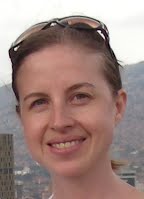
Hailing from Bear Valley, CA, Julia is a recent transplant to the Bay Area. She is passionate about environmental work and has been active in restoration and outreach for the last 10 years. She is a published author and has written articles and blogs for the Institute for Policy Studies in Washington, DC. She worked for the City of Arcata’s Environmental Services Department for 3 years where she assisted in multiple aspects of wetland restoration, coordinated environmental outreach and educational events, in addition to serving on the Solid Waste Task Force. She is currently the Corporate Accounts Manager at California Delicious, promoting local, organic offerings of appreciation. She holds an MA in Diplomacy from Norwich University in Vermont and a BS in Environmental Science from Humboldt State University in California.
How long have you been a WEN member?
I have been a member since I moved to the Bay Area last April.
What do you like best about being part of WEN?
I enjoy attending WEN events and engaging in the various networking opportunities. I recently attended a WEN Career Panel and found it very enlightening. The experiences of the three panelists – Dian Grueneich, Jennifer Martin, and Paula Mints were profoundly inspiring and useful. I met several fascinating and accomplished women who were also very welcoming and helpful. I look forward to forming deeper bonds with WEN members and attending more WEN events
Tell us more about yourself
I am passionate about international environmental and agricultural policy development. I participated in the International Honors Program (IHP) with Boston University in 2002-03. We traveled to England, India, the Philippines, New Zealand and Mexico over the course of 2 semesters. Participation in this program influenced my perception of the world extremely and has absolutely shaped my current academic and career aspirations. The program began in Washington, DC. We interviewed a group of panelists at the World Bank days before the fall protests began, 3 months later we were living with Adivasi villagers in India who had been displaced by the making of the Narmada Dam project, which was funded by the World Bank. This example is indicative of the well-rounded view IHP afforded its students. This program inspired me to become more invested in learning about my cultural heritage. As a result, I moved to Latvia in 2007 to find my relatives and taught English to support myself. I met more than 15 cousins and a handful of aunts and uncles. I returned in 2010 to conduct research for my graduate thesis, focused on assessing the successes and failures of the post-Soviet agricultural reforms, which also discussed the affects on environment, culture and livelihood. After this project I moved to DC and began working for the Institute for Policy Studies where I created a green federal budget for the Converting a Militarized Economy project. I also had the great opportunity to publish an article on the dangers of Arctic drilling. I would like to be involved in developing sustainable international development strategies.
What are some of your other activities
I grew up in Bear Valley, California, a company ski town that ranges from about 60 full-time residents to thousands of tourists and second homeowners during the holidays or special events. I lead a very active and outdoorsy lifestyle and began skiing when I was 3 years old. We get an average of 30 feet of snow per year so the roads in the village are closed, requiring us to walk, snowshoe, ski or snowmobile into our homes. The closest high school is 55 miles away and 5,000 feet in elevation. Needless to say it was quite a task to run track and cross- country. My mother owned a scuba diving business in Key West so I was fortunate enough to learn to scuba dive at 12 years old and later earned a minor in underwater research at Humboldt State University. I grew up with a monumental respect for the power that the natural world can yield to bring profound rewards or immense tragedies. I have traveled to 19 countries and have studied or worked in most. I have studied 4 languages and am fascinated by stories and how different cultures interact with the natural world. I love to cook, read and garden and my goals are to practice sewing, paint & photography.
What environmental issues are of most concern to you?
I’m most concerned with water, food and forests. I have hiked through majestic rainforests and witnessed the abject poverty and pollution of mega city slums. I understand that there are extreme differences in access to natural resources and basic human needs. I would like to restore the natural environment and increase the voice of those who are struggling as a result of top down development approaches and increasing inequality nationally and internationally
Wetlands are incredibly efficient and under-utilized filters for human waste. If you haven’t visited the Arcata Marsh, I highly recommend taking a tour of their impressive natural tertiary sewage treatment system.
I’m also very concerned by the conventional food industry. I visited the International Rice Research Institute in the Philippines and they housed an impressive seed bank and engineered incredibly expensive farm equipment. Their mission was to alleviate poverty; however, when we spoke to an assembly of farmers they revealed they had been struggling to afford the fertilizer and roundup ready seeds they had come to rely on.
I am very interested in sustainable forest management. Forests have always provided a sanctuary for me and hold a very special place in my heart. My IHP final project involved in-country interviews in India, the Philippines and Mexico to compare cross-cultural activism techniques in order to ensure sustainable use access to forests by indigenous and preservation from government and corporate clear-cutting.
